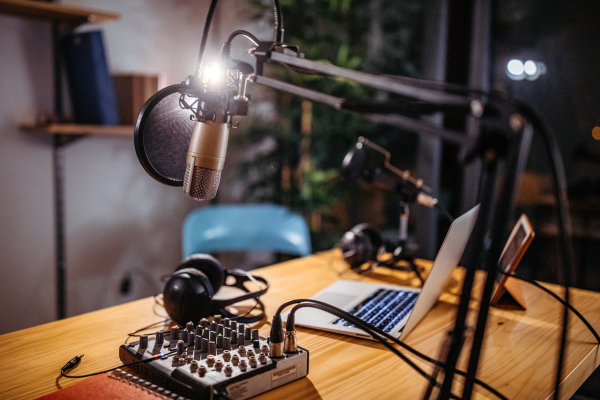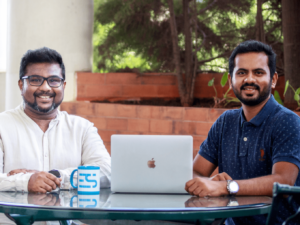As podcasting continues to gain ground among mainstream consumers as a digital media platform alongside music, video, and the printed word, a startup that made a name for itself through building content for the medium has closed a round of funding to help it explore what comes next.
WaitWhat, co-founded by two of the people who helped conceive of and build the TED digital media empire, has closed a round of $12 million, led by Raga Partners, with Laurene Powell Jobs’ firm Emerson Collective, Lupa Systems, Capital One Ventures, Maywic Select Investments, GingerBread Capital, Burda Principal Investments, Cue Ball Capital and Reid Hoffman also participating.
WaitWhat says it plans to use the money to continue producing content in formats that have already proven very successful for it so far — to date, it has seen 70 million downloads of its work, which includes the podcasts “Masters of Scale” from Reid Hoffman, “Meditative Story,” “Spark & Fire” and “Should this Exist?” — as well as invest in its tech and R&D and efforts to break new ground for new kinds of formats.
The company may be best known for its podcast production, but it describes itself as a “media invention company,” and co-founders June Cohen and Deron Triff want to double down on the invention part of that description, going past podcasting to explore other ways of interacting with users.
“We’re working on an innovative content format for physical well-being that lives inside of workouts, but will come at the experience through storytelling,” the pair said in an email (which we had to move to after our phone conversation, while they were on the road in a car, broke up. Maybe in-car calls need to be disrupted soon, too). “After physical well-being, we see intergenerational experiences (parent/child) as another interesting white space that plays into habit and human potential, and are in the early stages of developing a television series to explore this arena.”
An existing iteration on the podcast theme — a entrepreneur training course that it has developed in connection with its Masters of Scale podcast, has been downloaded 10,000 times in its first 8 weeks on the market. And Meditative Story, which focuses on mindfulness, is being downloaded 750,000 times each month. In this they have focused on an important aspect of any digital service: “As with the podcast format, it’s all about habit,” they said.
But it is more than that: At a time when podcasting may still be somewhat nascent as a business model, while at the same time at the risk of starting to be too formulaic, the company’s catching attention for exploring ways to address both of those issues.
Its solution, in part, may be based on creative ways of presenting content to users, but also keeping a focus on strong material to use in those channels.
“Our aim is to build the most valuable independent portfolio of premium IP — one that’s designed around essential human needs and built with a contrarian strategy to scale,” the pair said in the email. “We see an outsized opportunity for alternative content that lives at the intersection of daily habit and fulfilling human potential. Our success is linked to how we build content ecosystems where habit and human potential come together.”
There is potentially a lot of money in making compelling podcasting content, of course, but for now a good chunk of that is coming in the form of M&A, specifically from companies like Spotify looking to buy much bigger audiences that it can coalesce around its own advertising and paid subscription efforts, or by buying into new tech for creating and organizing this kind of content.
WaitWhat presents an interesting variation on that theme, by building a startup around the idea of innovating within and beyond the podcast medium, which could catch the eye again of the same players who are watching and snapping up content companies today.
Something interesting in how Cohen and Triff have approached fundraising is that they say they have done it in part to “secure diversity” at the startup. In part this is about hiring people from a mix of backgrounds but also about how it approaches management and how it endorses those with whom it works.
“We see our fundraising rounds as a tool for securing diversity,” they noted. “We know that’s not a typical viewpoint. But we have found ways to use our fundraising rounds to leap us forward on diversity — in a few different ways.”
They note that in the seed round, they raised half of the funds from investors who identify as women. “We did this by raising from women first. Most people thought we were crazy. (‘Just take the money where you find it!’ was the advice we got.) But it’s what we believed in, and it’s what we did,” they said.
Then in the Series A (we covered it here), “our lead investors had diverse funds, but they weren’t women-led. So we created a carve-out to create balance. And raised additional funds from women-led funds to balance us out.”
In this latest Series B, “we shifted our focus from total dollars to representation on the board,” they said. “We actually wrote into our term sheet that WaitWhat will always maintain gender balance on the board. In this round, we shifted to a five-person board, so what that means is that we won’t have less than two people who identify as women — or less than two people who identify as men. Our investors haven’t seen a company request this before — but they welcomed it, and shared that they wished more companies would ask.”
Far from annoying the men in the room, it seems to have gotten them even more on board with the idea of purpose existing alongside business interests.
“Drawing on our background of investing in companies that have demonstrated the ability to build loyalty and community around high-quality content and experiences, we are big believers in WaitWhat’s approach to deliver durable and adaptive content, helping people become the best versions of themselves,” said Atul Joshi, founder and managing partner of Raga Partners, who led the investment for the firm.









